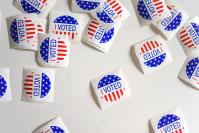|
Monday, April 25, 2022
 New Jersey Conscientious Employee Protection Act, N.J.S.A. 34:19-1 et seq. Read more . . .
Monday, April 18, 2022
 Racial equilibrium in the US workplace is erroneously assumed by many to be the current state of societal norms. Yet unbelievable as it seems to many non-Blacks, severe racist names including the use of the N-Word, is still far too common in some American workplaces. The extensive absence of open and honest recognition regarding widespread systemic racism and individual bigotry contributes to the willing suspension of disbelief that racist epithets are still being uttered in some American workplaces. What’s in a Name? The connotation of the racist name itself can materially contribute to the remark's severity and it’s psychological effect. When acts of racial epithets occur in one’s workplace, they are especially egregious and capable of engendering a severe impact. Read more . . .
Monday, April 11, 2022
 Advocates for workers’ rights are extolling the confirmation of Judge Ketanji Brown Jackson for appointment to US Supreme Court. Judge Jackson will replace Associate Justice Stephen G. Breyer who will retire from the Court at the end of the 2021-22 term. An opinion held in many legal circles is that the confirmation of Judge Jackson however is unlikely to fundamentally change the character of the Court, based on reviewing the filed Dissenting Opinions and other written Decisions of Associate Justice Stephen G. Breyer and Judge Ketanji Brown Jackson. Read more . . .
Monday, April 4, 2022
 Older employees may become distraught when after they report to their employer that they are being harassed as a result of their age, the employer responds that they are not being reasonable, or that a harassed employee is being too “sensitive”. Employees who don't receive what they believe to be appropriate responses to their complaints may begin to doubt themselves and their own perceptions. They may even begin to ask themselves, “Am I being too sensitive? Am I being unreasonable?” The Legal Standard That New Jersey Courts Apply as to “Reasonable Person” in Hostile Work Environment Cases Has an Objective Component and a Subjective Component. Various courts have used the “reasonable” person standard in harassment and hostile work environment cases going back to the 1990's, predominantly in the 9th Circuit to analyze Federal sexual harassment cases that were filed under Title VII of the 1964 Civil Rights Act, 42 U.S. Read more . . .
Monday, March 28, 2022
 Earlier this month, President Biden signed legislation which had Congressional bi-partisan support into law, which bill ends the forced arbitration of employee sexual harassment and assault cases. This new law takes effect retroactively and is called the, “Ending Forced Arbitration of Sexual Assault and Sexual Harassment Act of 2021.” This is good news for employees. The survivors of sexual harassment and assault may now once again file lawsuits in court against their perpetrators, and they are no longer prohibited from going to court on these matters as they were when these claims were precluded by the Federal Arbitration Act. Forced arbitration shields workplace sexual predators instead of holding them accountable for their heinous acts. Read more . . .
Monday, March 21, 2022
 When an employee objects to or refuses to comply with what he/she believes to be the public or private employer’s illegal acts, the management may quickly spring into gear to contrive a bogus justification to terminate the complaining employee. Employer’s First Step Heading to an Illegal Retaliatory Termination Frequently, the first step a devious employer may take against a whistleblowing employee who previously had good evaluations, is to give the employee a negative employee performance evaluation, or place them on a P.I.P. (Personal Improvement Plan), or give them a written warning that their work is deficient in some way. Read more . . .
Monday, March 14, 2022
 Black and Hispanic workers are over represented in numerous industries considered to be essential services during the pandemic. Yet Black and Hispanic workers are disproportionately working in some of the lowest paid of these essential occupations. It is even more troubling that even within these already low paying occupations, frequently below a livable wage, workers are sometimes discriminated against because of their race or ethnicity. These may include packers and packagers, laborers in freight and stock, janitors, transportation and building cleaners, warehouse workers, grocery store clerks, childcare workers, personal care aides and others. In New Jersey, if you are a member of a racial or ethnic class paid less than your co-workers who are in a different class, for doing substantially the same job as they are doing, you may have an unequal pay and wage claim under the Diane B. Read more . . .
Monday, March 7, 2022
 People often assume whistleblowing employees to be lower or mid-level workers who complain about what they believe to be the employer’s illegal activities. In other words, it’s a David and Goliath fight. Upper-level executives may believe it to be their job responsibility to squash reporting about the employer’s illegal business practices, rather than having a duty to bring it to the attention of those higher in authority within the corporate structure. In fact, upper-level managers may experience retaliation when they object to their supervisor what they believe to be an illegal business practice. The person next in authority could even be the CEO and/or owner of the owner of the company. Read more . . .
Monday, February 28, 2022
 A Senate filibuster in January 2022 caused efforts toward passage of the John Lewis Voting Rights Advancement Act to come to a screeching halt last month. The John Lewis Voting Rights Advancement Act was renamed and combined with another bill in the Senate and introduced to restore key parts of the 1965 Voting Rights Act. The Senate filibuster prevented passage in the Senate, which bill if signed into law would strengthen voting rights protections for all voters, regardless of color or economic class. The bill was originally introduced in the House of Representatives by Rep. Terri Sewell (D-Ala. Read more . . .
Monday, February 21, 2022
 It is fitting in Black History Month 2022, that attention be given to the proposed John Lewis Voting Rights Advancement Act. When states pass voter suppression laws that target Black voters by disqualifying their votes, or by enacting rules designed to throw up obstacles to Black voters getting to the polls, it goes against the intent of the 1965 Voting Rights Act. It can effectively diminish the total Black vote when there are certain changes to the rules that allow ballots to be submitted and counted. Research of certain racial and economic demographics demonstrate certain persons of color and lower economic classes are more likely to submit mail-in ballots or vote early because their employment and commuting schedule would make it virtually impossible to get to the polls on the actual election day, unless they take a work day off without pay. Also, the removal of historically, conveniently-placed ballot boxes where certain working-class people would drop off their ballots in-between going from one job to the next etc. Read more . . .
Monday, February 14, 2022
 In New Jersey as of January 1, 2022, the minimum wage required to be paid by most employers is $13.00 an hour, which is up one dollar from the $12.00 minimum in 2021. A woman working full-time at thirteen dollars an hour does not receive sufficient wages to support herself and contribute to her families’ support, yet many women in New Jersey attempt to do so. In NJ, as in other states throughout the US, many of these low paid women are employed as food preparation/ serving workers whose employers include fast food national and international chain industries. Read more . . .
|

|
|
|